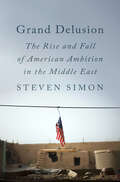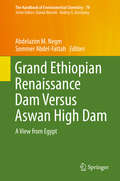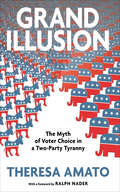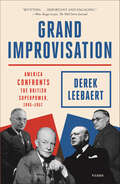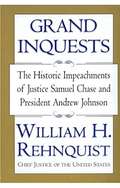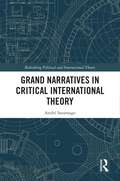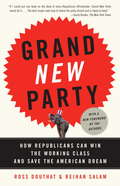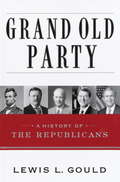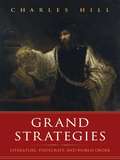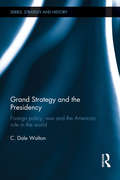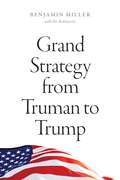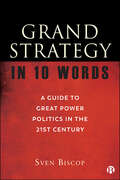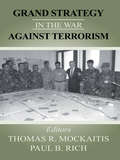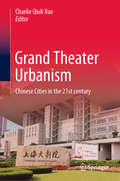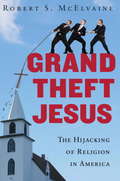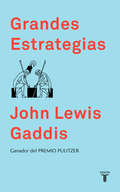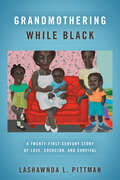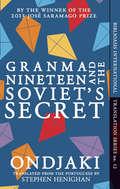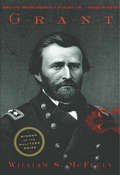- Table View
- List View
Grand Delusion: The Rise and Fall of American Ambition in the Middle East
by Steven SimonA longtime American foreign policy insider&’s penetrating and definitive reckoning with this country&’s involvement in the Middle East—and its bitter endThe culmination of almost forty years at the highest levels of policymaking and scholarship, Grand Delusion is Steven Simon&’s tour de force, offering a comprehensive and deeply informed account of U.S. engagement in the Middle East. Simon begins with the Reagan administration, when American perception of the Middle East shifted from a cluster of faraway and frequently skirmishing nations to a shining, urgent opportunity for America to (in Reagan&’s words) &“serve the cause of world peace and the future of mankind.&”Reagan fired the starting gun on decades of deepening American involvement, but as the global economy grew, bringing an increasing reliance on oil, U.S. diplomatic and military energies were ever more fatefully absorbed by the Middle East until the Obama administration and its successors finally sought to disentangle America from the region. Grand Delusion explores the motivations, strategies, and shortcomings of each presidential administration from Reagan to today, exposing a web of intertwined events—from Lebanese civil conflict to shifting Iranian domestic politics, Cold War rivalries, and Saudi Arabia&’s quest for security to 9/11 and the war on terror—managed by a Washington policy process frequently ruled by wishful thinking and partisan politics.Simon&’s sharp sense of irony and incisive writing bring a complex history to life. He questions the motives behind America's commitment to Israel; explodes the popular narrative of Desert Storm as a &“good war&”; and calls out the devastating consequences of our mistakes, particularly for people of the region trapped by the onslaught of American military action and pitiless economic sanctions. Grand Delusion reveals that this story, while episodically impressive, was too often tragic and at times dishonorable. As we enter a new era in foreign policy, this is an essential book, a cautionary history that illuminates American's propensity for self-deception and misadventure at a moment when the nation is redefining its engagement with a world in crisis.
Grand Ethiopian Renaissance Dam Versus Aswan High Dam: A View from Egypt (The Handbook of Environmental Chemistry #79)
by Abdelazim M. Negm Sommer Abdel-FattahThis unique volume discusses various aspects of the Grand Ethiopian Renaissance Dam (GERD) and the Aswan High Dam (AHD) including their positive and negative impacts. It presents up-to-date research findings by Egyptian scientists and researchers covering several interesting hot topics under the following main themes: · Major impacts of GERD compared with the AHD · Environmental impacts of the AHD · Modeling scenarios investigating the impacts of GERD on the AHD and downstream · Environmental and social impacts of GERD on Egypt · Status and assessment of the sediment of the AHD reservoir and modeling the impacts of GERD on Lake Nubia sediment accumulation · Proposed scenarios for maximizing the benefits of the AHD reservoir · International aspects of GERD and the AHD The volume also offers a set of conclusions and recommendations to optimize the cooperation between Egypt, Sudan, and Ethiopia. It appeals to postgraduate students, researchers, scientists, professionals and policy planners.
Grand Hotel Abyss: The Lives of the Frankfurt School
by Stuart JeffriesThis brilliant group biography asks who were the Frankfurt School and why they matter todayIn 1923, a group of young radical German thinkers and intellectuals came together to at Victoria Alle 7, Frankfurt, determined to explain the workings of the modern world. Among the most prominent members of what became the Frankfurt School were the philosophers Walter Benjamin, Theodor Adorno, Max Horkheimer, and Herbert Marcuse. Not only would they change the way we think, but also the subjects we deem worthy of intellectual investigation. Their lives, like their ideas, profoundly, sometimes tragically, reflected and shaped the shattering events of the twentieth century.Grand Hotel Abyss combines biography, philosophy, and storytelling to reveal how the Frankfurt thinkers gathered in hopes of understanding the politics of culture during the rise of fascism. Some of them, forced to escape the horrors of Nazi Germany, later found exile in the United States. Benjamin, with his last great work--the incomplete Arcades Project--in his suitcase, was arrested in Spain and committed suicide when threatened with deportation to Nazi-occupied France. On the other side of the Atlantic, Adorno failed in his bid to become a Hollywood screenwriter, denounced jazz, and even met Charlie Chaplin in Malibu.After the war, there was a resurgence of interest in the School. From the relative comfort of sun-drenched California, Herbert Marcuse wrote the classic One Dimensional Man, which influenced the 1960s counterculture and thinkers such as Angela Davis; while in a tragic coda, Adorno died from a heart attack following confrontations with student radicals in Berlin.By taking popular culture seriously as an object of study--whether it was film, music, ideas, or consumerism--the Frankfurt School elaborated upon the nature and crisis of our mass-produced, mechanised society. Grand Hotel Abyss shows how much these ideas still tell us about our age of social media and runaway consumption.From the Hardcover edition.
Grand Illusion: The Myth of Voter Choice in a Two-Party Tyranny
by Theresa AmatoRalph Nader&’s former campaign manager &“takes the biggest swing—not a jab, but a roundhouse punch—at America&’s corrupt electoral system&” (Phil Donahue). As the national campaign manager for Ralph Nader&’s historic runs for president in 2000 and 2004, Theresa Amato had a rare ringside role in two of the most hotly contested presidential elections this country has seen. In Grand Illusion, she gives us a witty, thoughtful critique of the American electoral system, as well as a powerful argument for opening up the contest as if people and their daily lives mattered. While making the case for specific reforms in the United States&’ arcane system of ballot access laws, complex federal regulations, and partisan control of elections, Amato also offers a spirited history of how third-party and Independent candidates have kept important issues on the table in elections past and contribute to our country&’s political life. Even the most fervent Nader critics will think twice about Nader&’s role in 2000, thanks to Amato&’s trenchant factual analysis. Looking beyond the Nader story to campaigns waged by challengers John Anderson, Ross Perot, Pat Buchanan, and others, Amato shows how limiting ourselves to two candidates deprives our country of a robust political life, strips would-be contenders of their free speech and association rights, and cheats voters out of meaningful political choices. &“Amato displays an encyclopedic knowledge of election law, and her recommendations for election reform, including a comprehensive plan for &‘Federal Administration and Financing of Elections,&’ are crucial contributions to the debate over election law.&” —Publishers Weekly
Grand Improvisation: America Confronts the British Superpower, 1945–1957
by Derek LeebaertA new understanding of the post World War II era, showing what occurred when the British Empire wouldn’t step aside for the rising American superpower—with global insights for today.An enduring myth of the twentieth century is that the United States rapidly became a superpower in the years after World War II, when the British Empire—the greatest in history—was too wounded to maintain a global presence. In fact, Derek Leebaert argues in Grand Improvisation, the idea that a traditionally insular United States suddenly transformed itself into the leader of the free world is illusory, as is the notion that the British colossus was compelled to retreat. The United States and the U.K. had a dozen abrasive years until Washington issued a “declaration of independence” from British influence. Only then did America explicitly assume leadership of the world order just taking shape. Leebaert’s character-driven narrative shows such figures as Churchill, Truman, Eisenhower, and Kennan in an entirely new light, while unveiling players of at least equal weight on pivotal events. Little unfolded as historians believe: the Truman Doctrine and the Marshall Plan; the Korean War; America’s descent into Vietnam. Instead, we see nonstop U.S. improvisation until America finally lost all caution and embraced obligations worldwide, a burden we bear today.Understanding all of this properly is vital to understanding the rise and fall of superpowers, why we’re now skeptical of commitments overseas, how the Middle East plunged into disorder, why Europe is fracturing, what China intends—and the ongoing perils to the U.S. world role.
Grand Inquests: The Historic Impeachments Of Justice Samuel Chase And President Andrew Johnson
by William H. RehnquistRecounts two precedent-setting impeachment cases that strengthened the concept of separation of powers and further defined the institutions of American government
Grand Narratives in Critical International Theory (Rethinking Political and International Theory)
by André SaramagoCritical international theory has the task of providing orientation to human beings in better understanding their conditions of existence, how those conditions came to assume their contemporary characteristics, and what immanent potential they might hold for emancipatory transformation. The argument in this book is that this task of orientation is indissociable from a reliance on grand narratives that capture the main features of the long-term process of human development. And yet, many of these grand narratives also tend to reproduce Eurocentric worldviews that undermine critical international theory’s reliability as a means of orientation. In this book, André Saramago provides an innovative answer to the problem of orientation with which critical international theory is confronted. Through an indepth engagement with the work of Jürgen Habermas, Karl Marx, and Norbert Elias, he recovers a historical-sociological approach to grand narratives that avoids a reproduction of their Eurocentric shortcomings. In the process, he improves critical international theory’s role as a means of orientation by making it better theoretically equipped to capture the interweaving of the historical development of the human capacity for self-determination in the four key dimensions of human existence: people’s relations with themselves as individuals; social relations at both the intra- and inter-societal levels; and people’s relations with non-human nature. This book will appeal to all students and researchers interested in interdisciplinary and critical approaches to the study of world politics, long-term processes of social change, and human-nature relations, working within or across the fields of International Relations, Sociology, Political Theory, and related areas of inquiry.
Grand New Party
by Ross Douthat Reihan SalamIn a provocative challenge to Republican conventional wisdom, two of the Right's rising young thinkers call upon the GOP to focus on the interests and needs of working-class voters.Grand New Party lays bare the failures of the conservative revolution and presents a detailed blueprint for building the next Republican majority. Blending history, analysis, and fresh, often controversial recommendations, Ross Douthat and Reihan Salam argue that it is time to move beyond the Reagan legacy and the current Republican power structure. With specific proposals covering such hot-button topics as immigration, health care, and taxes, Grand New Party shakes up the Right, challenges the Left, and confronts the changing political landscape.From the Trade Paperback edition.
Grand Old Party: A History of the Republicans
by Lewis L. GouldFrom Abraham Lincoln and the Civil War through the disputed election of George W. Bush and beyond, the Republican Party has been at the dramatic center of American politics for 150 years. In this exciting new book, the Þrst comprehensive history of the Republicans in 40 years, Lewis L. Gould traces the evolution of the Grand Old Party from its emergence as an antislavery coalition in the 1850s to its current role as the champion of political and social conservatism. Gould brings to life the major Þgures of Republican history--Lincoln, Theodore Roosevelt, Dwight D. Eisenhower, Richard Nixon, Ronald Rea-gan, and George W. Bush--and uncovers a wealth of fascinating anecdotes about Republicans, from "the Plumed Knight," James G. Blaine, in the 1880s, to Barry Goldwater in the 1960s, to Newt Gingrich in the 1990s. Gould also uncovers the historical forces and issues that have made the Republicans what they are: the crusade against slavery, the rise of big business, the Cold War, and opposition to the power of the federal government. Written with balance and keen insight,Grand Old Partyis required reading for anyone interested in American politics. Republicans, Democrats, and independents alike will Þnd their understanding of national politics deepened and enriched. Based on Gould's research in the papers of leading Republi-cans and his wide reading in the party's history, Grand Old Party is a book that will outlast the noisy tumult of today's partisan debates and endure as a deÞnitive treatment of how the Republicans have shaped the way Americans live together in a democracy. For the next presidential election and for other electoral contests to come, this book (a perfect companion toParty of the Peopleby Jules Witcover, a history of the Democratic Party published simultaneously by Random House) will be an invaluable guide to the unfolding saga of American politics. From the Hardcover edition.
Grand Strategies: Literature, Statecraft, and World Order
by Charles Hill"The international world of states and their modern system is a literary realm," writes Charles Hill in this powerful work on the practice of international relations. "It is where the greatest issues of the human condition are played out. " A distinguished lifelong diplomat and educator, Hill aims to revive the ancient tradition of statecraft as practiced by humane and broadly educated men and women. Through lucid and compelling discussions of classic literary works from Homer to Rushdie,Grand Strategiesrepresents a merger of literature and international relations, inspired by the conviction that "a grand strategist . . . needs to be immersed in classic texts from Sun Tzu to Thucydides to George Kennan, to gain real-world experience through internships in the realms of statecraft, and to bring this learning and experience to bear on contemporary issues. " This fascinating and engaging introduction to the basic concepts of the international order not only defines what it is to build a civil society through diplomacy, justice, and lawful governance but also describes how these ideas emerge from and reflect human nature.
Grand Strategy and Military Alliances
by Williamson Murray Peter R. Mansoor Mansoor, Peter R. and Murray, WilliamsonAlliances have shaped grand strategy and warfare since the dawn of civilization. Indeed, it is doubtful that the United States of America would have gained its independence without its Revolutionary War alliance with France. Such alliances may prove even more important to international security in the twenty-first century. Economic and financial difficulties alone will ensure that policy makers attempt to spread the burden of securing vital interests onto other nations through alliances, both formal organizations such as NATO and informal alliances of convenience as developed to wage the Gulf War in 1991. A team of leading historians examine the problems inherent in alliance politics and relationships in the framework of grand strategy through the lens of history. Aimed at not just the military aspects of alliances, the book uncovers the myriad factors that have made such coalitions succeed or fail in the past.
Grand Strategy and the Presidency: Foreign Policy, War and the American Role in the World (Strategy and History)
by C. Dale WaltonThis book examines the role and importance of the Presidency in the formulation and conduct of US grand strategy. The text discusses US strategic history, with particular emphasis on the period from the end of the Cold War to the present day. While the United States periodically has enjoyed exceptional presidential leadership in the past, this book argues that few future presidents will meet high standards of leadership in foreign affairs. In turn, this will undermine the ability of the United States to construct and maintain a coherent grand strategy appropriate to the multipolar world of the twenty-first century. Grand Strategy and the Presidency explores the role that the holders of the presidential office have played in the past development of the United States as a great power. Drawing upon examples from history, the textual analysis is shaped around the description of the long-term strategic development of the United States. The author then considers what the events of recent decades portend for the future of US strategy and foreign policy. This book will be of interest to students of Presidential Studies, US foreign policy, Strategic Studies, and IR/Security Studies in general.
Grand Strategy from Truman to Trump
by Ziv Rubinovitz Benjamin MillerAmerican foreign policy is the subject of extensive debate. Many look to domestic factors as the driving forces of bad policies. Benjamin Miller instead seeks to account for changes in US international strategy by developing a theory of grand strategy that captures the key security approaches available to US decision-makers in times of war and peace. Grand Strategy from Truman to Trump makes a crucial contribution to our understanding of competing grand strategies that accounts for objectives and means of security policy. Miller puts forward a model that is widely applicable, based on empirical evidence from post-WWII to today, and shows that external factors—rather than internal concerns—are the most determinative.
Grand Strategy in 10 Words: A Guide to Great Power Politics in the 21st Century
by Sven BiscopIn a world that has returned to great power rivalry, understanding the grand strategy of these powers is crucial. This book introduces ten key terms for analysing grand strategy and shows how the world’s great powers – the United States, China, Russia and the European Union (EU) – shape their strategic decisions today. Outlining the steps needed for a less confrontational grand strategy and a more peaceful and stable world order, this lively and accessible introduction shows how the choices made in each of these ten areas will determine the course of world politics in the first half of the 21st century.
Grand Strategy in Theory and Practice
by William C. MartelThis book explores fundamental questions about grand strategy, as it has evolved across generations and countries. It provides an overview of the ancient era of grand strategy and a detailed discussion of its philosophical, military, and economic foundations in the modern era. The author investigates these aspects through the lenses of four approaches - those of historians, social scientists, practitioners, and military strategists. The main goal is to provide contemporary policy makers and scholars with a historic and analytic framework in which to evaluate and conduct grand strategy. By providing greater analytical clarity about grand strategy and describing its nature and its utility for the state, this book presents a comprehensive theory on the practice of grand strategy in order to articulate the United States' past, present, and future purpose and position on the world stage.
Grand Strategy in the War Against Terrorism
by Paul B. Rich Thomas R. MockaitisThis collection of essays examines the strategic dimensions of contemporary terrorist threats. It evaluates the changing nature of modern terrorism in the light of the events of September 11 2001. The collection argues that terrorism now promises to enter the terrain of global "grand strategy".
Grand Theater Urbanism: Chinese Cities in the 21st century
by Charlie Qiuli XueThis volume explores the phenomenon and trend of cultural buildings by investigating 10 typical cities in China from the first, second, and third tiers, and from the Chinese diaspora. Each grand theater design was the result of a high-profile international competition and created by global architects in collaboration with Chinese design institutes. The national and international significance of these iconic projects lies in the fact that they not only reflect the dynamics of global design ideas, but also represent a particular historical moment in China’s modernization process. The development, histories, and purposes of constructing cultural buildings are carefully outlined and colorfully presented. Given China’s tremendous population, the development trajectory of its urban construction will provide insights for other regions that hope to embark on the high-speed track in the 21st century.“In 'Grand Theater Urbanism', Professor Charlie Xue and his team document China’s current shift towards a culture of consumption and leisure, symbolized by the construction of multi-use Grand Theaters in major cities. 'Grand Theater Urbanism' reveals the unexpected variety and complexity of this contemporary cultural drive in a series of exemplary chapters with highly detailed, local, case studies.” --Professor David Grahame Shane, Columbia University, New York "Jane Jacobs likened city life to a performance. This book goes a stage further and analyses the actual performance spaces within cities in China. In doing so it makes a valuable connection between urban design and the cultural life in cities. This is an important and often forgotten dimension of urbanism and I heartily commend this book to readers.'" --Professor Matthew Carmona, The Bartlett, University College London
Grand Theft Jesus: The Hijacking of Religion in America
by Robert S. McelvainePromising that he will not hesitate to call a spade a spade, McElvaine (history, Millsaps College, Mississippi) gathers into one lively volume accounts of the greed, corruption, scriptural distortion, political opportunism, and other sins committed by people in the US today not only pretending to be Christians but also claiming to speak for Jesus himself. The easy road to heaven, biblical inerrancy once Jesus is purged, unintelligent design, and blaming women are among his areas of investigation. Annotation ©2008 Book News, Inc. , Portland, OR (booknews. com)
Grandes estrategias
by John Lewis GaddisUna clase magistral sobre el arte del liderazgo por el mayor experto mundial en pensamiento estratégico. ¿Qué lecciones de estrategia y liderazgo podemos extraer de la derrota de la Armada Invencible, de la actuación de Churchill en la Segunda Guerra Mundial o de las astutas decisiones de Pericles en la Grecia antigua? John Lewis Gaddis cuenta las más sorprendentes maniobras, fallidas o atinadas, desde el mundo clásico hasta la Segunda Guerra Mundial, y profundiza en el pensamiento estratégico a partir de figuras como Heródoto, César Augusto, San Agustín, Maquiavelo, Felipe II, Clausewitz, Tolstói, Lincoln, Roosevelt o Isaiah Berlin. Gaddis, distinguido historiador de la Guerra Fría, ha estado durante casi dos décadas al frente del legendario programa de estrategia de la Universidad de Yale. En Grandes estrategias reflexiona sobre todo lo aprendido y aplica sus profundos conocimientos para conectar momentos, lugares y personas como nunca antes se había hecho. Para cualquier persona interesada en el arte de la estrategia en cualquier terreno, este libro es una clase magistral. La crítica ha dicho...«Una valiosa defensa de las artes liberales, una reflexión atractiva sobre la educación universitaria y algún consejo oportuno sobre cómo la victoria duradera consiste en ganar lo que puedas en lugar de todo lo que deseas.»Victor Davis Hanson, The New York Times «Brillante, sabio, escrito de manera seductora y profundo.»Roger Kimball, The New Criterion «Gaddis se ha ganado el derecho indiscutible a arar en diferentes campos de investigación histórica, cosa que hace aquí con evidente deleite y curiosidad peripatética.»Gordon M. Goldstein, The Washington Post «Un largo paseo en compañía de una mente única y encantadora, que logra transmitir las lecciones extraídas de distintos continentes y milenios.»John Nagl, The Wall Street Journal «Todo lo que hay que saber sobre cómo los líderes toman decisiones estratégicas. Un estudio sabio e ingenioso del pasado al servicio del futuro.»Kirkus Reviews «Gaddis muestra un profundo conocimiento de la historia y ofrece un estilo de prosa agradablemente sintético a este riguroso estudio del liderazgo.»Publishers Weekly
Grandma's Gardens
by Chelsea Clinton Hillary ClintonFrom mother-daughter team Hillary Clinton and Chelsea Clinton comes a celebration of family, tradition and discovery, and an ode to mothers, grandmothers and the children they love.Grandma Dorothy shared her love of gardens with her daughter, Hillary, and her granddaughter, Chelsea. She taught them that gardens are magical places to learn, exciting spaces for discovery, quiet spots to spend time with family and beautiful areas to share stories and celebrate special occasions. But most of all, she taught them that in her gardens, her love grew and blossomed.In this inspiring and heartwarming mother-daughter story, Hillary Clinton and Chelsea Clinton team up to show readers how sharing the things we love with the people we love can create powerful, everlasting bonds between generations.Praise for Grandma's Gardens:"A deeply affectionate tribute to the bounty of nature and the love of gardening." --Publishers Weekly"Filled with mindfulness, the story inspires children to reflect on family and keep memories alive." --Booklist
Grandmothering While Black: A Twenty-First-Century Story of Love, Coercion, and Survival
by LaShawnDa L. PittmanIn Grandmothering While Black, sociologist LaShawnDa L. Pittman explores the complex lives of Black grandmothers raising their grandchildren in skipped-generation households (consisting only of grandparents and grandchildren). She prioritizes the voices of Black grandmothers through in-depth interviews and ethnographic research at various sites—doctor's visits, welfare offices, school and day care center appointments, caseworker meetings, and more. Through careful examination, she explores the various forces that compel, constrain, and support Black grandmothers' caregiving. Pittman showcases a fundamental change in the relationship between grandmother and grandchild as grandmothers confront the paradox of fulfilling the social and legal functions of motherhood without the legal rights of the role. Grandmothering While Black illuminates the strategies used by grandmothers to manage their legal marginalization vis-à-vis parents and the state across a range of caregiving arrangements. In doing so, it reveals the overwhelming and painful decisions Black grandmothers must make to ensure the safety and well-being of the next generation.
Granma Nineteen and the Soviet's Secret
by OndjakiBY THE WINNER OF THE 2013 JOSÉ SARAMAGO PRIZEAN AFRICA39/UNESCO CITY OF LITERATURE 2014 TOP AFRICAN WRITER UNDER 40A GUARDIAN TOP FIVE AFRICAN WRITER, 2012WINNER OF THE GRINZANE PRIZE FOR BEST YOUNG WRITER, 2010By the beaches of Luanda, the Soviets are building a grand mausoleum in honour of the Comrade President. Granmas are whispering: houses, they say, will be dexploded, and everyone will have to leave. With the help of his friends Charlita and Pi (whom everyone calls 3.14), and with assistance from Dr. Rafael KnockKnock, the Comrade Gas Jockey, the amorous Gudafterov, crazy Sea Foam, and a ghost, our young hero must decide exactly how much trouble he's willing to face to keep his Granma safe in Bishop's Beach.Energetic and colourful, impish and playful, Granma Nineteen and the Soviet's Secret is a charming coming-of-age story from the next rising star in African literature.
Grano e non zizzania: Onore a un Maresciallo
by Guido Galeano VegaDescrizione del libro: In Grano e Non Zizzania si potrà vedere che, nonostante i progressi della scienza e della tecnologia, e nonostante tutte le esperienze riportate, l'umanità si sta muovendo verso la ripetizione di vecchi errori. Si potrà capire chiaramente che la maledizione del peccato, del male e della violenza è ancora insita nella genetica umana e, in un certo senso, le Sacre Scritture hanno di nuovo ragione. Il desiderio dello scrittore di Grano e Non Zizzania è di motivare a rafforzare i valori nobili nella vita della società umana, perché è una lotta di ciascuno, scegliere tra il bene e il male, non solo per ogni comune cittadino, ma anche per coloro che hanno la dura responsabilità della guida di nazioni, etnie e popoli. C'è una vecchia storia, in cui si racconta che viene chiesto ad un anziano il perché del bene e del male nelle persone. Il vecchio gli spiega che all'interno dell'essere umano ci sono due lupi, uno è un lupo buono e l'altro è un lupo cattivo, e sopravvive e diventa forte quello che viene nutrito, e muore quello che viene lasciato indifeso ed abbandonato. Se le nazioni continuano a fabbricare bombe nucleari ed investono milioni di dollari in materiale bellico, il lupo cattivo sta trionfando di nuovo nel mondo. Se ci lamentiamo del mondo in cui viviamo, non è perché il mondo sia cattivo, ma perché le persone non vogliono essere buone. Ognuno è responsabile per il miglioramento. La violenza non è una soluzione, è solo una scusa per coloro che servono e amano la violenza ed alimentano le loro priorità coi benefici che ne derivano. Siamo tutti chiamati da Dio ad essere grano e non zizzania. parole chiave: Alleanza, Grande Guerra, Triplice Alleanza, Guerra del Paraguay, Maresciallo Lopez, Grano, Zizzania, Difesa
Grant
by Jean Edward SmithUlysses S. Grant was the first four-star general in the history of the United States Army and the only president between Andrew Jackson and Woodrow Wilson to serve eight consecutive years in the White House. As general in chief, Grant revolutionized modern warfare. Rather than capture enemy territory or march on Southern cities, he concentrated on engaging and defeating the Confederate armies in the field, and he pursued that strategy relentlessly. As president, he brought stability to the country after years of war and upheaval. He tried to carry out the policies of Abraham Lincoln, the man he admired above all others, and to a considerable degree he succeeded. Yet today, Grant is remembered as a brilliant general but a failed president. In this comprehensive biography, Jean Edward Smith reconciles these conflicting assessments of Grant's life. He argues convincingly that Grant is greatly underrated as a president. Following the turmoil of Andrew Johnson's administration, Grant guided the nation through the post- Civil War era, overseeing Reconstruction of the South and enforcing the freedoms of new African-American citizens. His presidential accomplishments were as considerable as his military victories, says Smith, for the same strength of character that made him successful on the battlefield also characterized his years in the White House. Grant was the most unlikely of military heroes: a great soldier who disliked the army and longed for a civilian career. After graduating from West Point, he served with distinction in the Mexican War. Following the war he grew stale on frontier garrison postings, despaired for his absent wife and children, and began drinking heavily. He resigned from the army in 1854, failed at farming and other business endeavors, and was working as a clerk in the family leathergoods store when the Civil War began. Denied a place in the regular army, he was commissioned a colonel of volunteers and, as victory followed victory, moved steadily up the Union chain of command. Lincoln saw in Grant the general he had been looking for, and in the spring of 1864 the president brought him east to take command of all the Union armies. Smith dispels the myth that Grant was a brutal general who willingly sacrificed his soldiers, pointing out that Grant's casualty ratio was consistently lower than Lee's. At the end of the war, Grant's generous terms to the Confederates at Appomattox foreshadowed his generosity to the South as president. But, as Smith notes, Grant also had his weaknesses. He was too trusting of his friends, some of whom schemed to profit through their association with him. Though Grant himself always acted honorably, his presidential administration was rocked by scandals. "He was the steadfast center about and on which everything else turned," Philip Sheridan wrote, and others who served under Grant felt the same way. It was this aura of stability and integrity that allowed Grant as president to override a growing sectionalism and to navigate such national crises as the Panic of 1873 and the disputed Hayes-Tilden election of 1876. At the end of his life, dying of cancer, Grant composed his memoirs, which are still regarded by historians as perhaps the finest military memoirs ever written. They sold phenomenally well, and Grant the failed businessman left his widow a fortune in royalties from sales of the book. His funeral procession through the streets of Manhattan closed the city, and behind his pallbearers, who included both Confederate and Union generals, marched thousands of veterans from both sides of the war.
Grant
by William S. McfeelyIn this stunning biography, William McFeely brings us a thoroughly compelling story of a tangled life.<P><P> Having once said "a military life had no charms to me," U.S. Grant entered West Point to get through the course, secure a detail for a few years as assistant professor of mathematics at the Academy, and afterwards obtain a permanent position as professor at some respectable college. But the course his life took was quite different. Little did he ever dream that he would serve with distinction in the Mexican War, lead the Union to victory in the Civil War, struggle through eight years as President of the United States, and wage bitter personal battles against alcoholism, insolvency, and cancer.<P> Pulitzer Prize Winner
